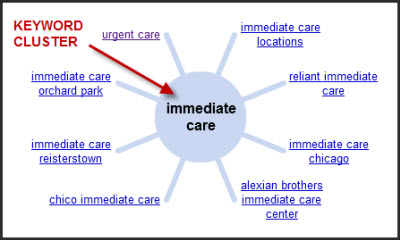 Depending on the type of website, it’s niche or industry and the level of competition, each requires a distinct tact to be effective amidst the countless competitors who are all vying for the same goal. That goal is to acquire and defend top ranking positions for keywords and key phrases to funnel relevant traffic.
Depending on the type of website, it’s niche or industry and the level of competition, each requires a distinct tact to be effective amidst the countless competitors who are all vying for the same goal. That goal is to acquire and defend top ranking positions for keywords and key phrases to funnel relevant traffic.

With so many places to start when searching for SEO, companies spend weeks conducting a thorough analysis or performance benchmarks, references and results when searching for the most qualified expert for the job.
To aid this process, this article is designed as an overview of the different types of optimization available and is intended to assist businesses seeking more information on the topic of SEO (search engine optimization) or SEM (search engine marketing).
The areas of SEO / SEM typically fall into one of the following categories:
- PPC (paid placement)
- Organic Optimization/ Natural Search (re-tooling existing web pages for higher relevance)
- Web Development (content management and development of content management systems)
- Link Popularity (link building or social media marketing to expedite search engine trust)
- Tracking and Analytics
There is no specific order or chronology for the types of services above, any or all of these SEO services can be implemented singularly or simultaneously depending on your budget or marketing objectives.
PPC: Some companies specialize in Adwords (which truly falls under the category of search engine marketing) otherwise known as PPC or Pay Per Click Marketing. The premise is simple, the search engines using tracking tools to determine the keywords which have the highest traffic conversion that visitors enter into search queries.
With PPC advertising / marketing, a value is assigned to keywords and key phrases that allows companies or individuals to bid on these keywords. The value is based on a metric of cost and traffic per keyword (the higher the demand, the higher the cost).
Based on the budget you provide, your link/ads will appear higher up in the sponsored section of search results (which are typically located to the right and on the top of the search results).
Your ads are evoked when someone executes a broad match (related topic) or exact match (semantically aligned topic or keyword) in search engines. It is a pay for performance model, yet the nuances of this type of marketing are rather intricate and riddled with trial and error to find the right formula for your landing pages.
Pay per click marketing does have its place, to direct eager searchers right to your solution or optimized landing page. Not to mention it skips the formalities of organic / natural search engine optimization.
Yet, the dependency to PPC and sponsored advertising is clear, cut and dried, in essence, no pay, no play so having healthy margin is crucial to engage this type of marketing for your website, products or services.
PPC is fine if you have a budget and you are more interested in luring visitors based on quick calls to action and landing pages (which work fine for most). However, if long-term placement is the objective, then organic search and organic search engine optimization is a cost-effective alternative / marketing platform.
Organic Search Engine Optimization: The concept behind organic SEO is to start with a solid foundation (based on keyword and market research) then strategically provide search engines with what they need (content and traction from traffic) to assign your website as an authority.
As a result of having relevant content on your website, search engine programs (known as user agents, bots or spiders) parse your pages and collect snippets of contextual data such as a combination of words (known as shingles) to assess what that page is about.
The key to organic search is to have enough pages on the topic (topical relevance), enough content and enough references (known as backlinks or inbound links) to tip the scale of relevance in your favor vs. a competitors website (known as peer review).
Fortunately what search engines want from a site remains constant, and it is through those constants that search engine optimizers utilize to find key areas for improvement to create the proper synergy of events.
Based on the co-occurrence of keywords and key phrases (a combination of words that people type into search engines when searching for a website) the page with the highest relevance score, trust and authority are returned.
There are benchmarks with each keyword and rankings are by the page, so depending on how your website is structured, if the content is accessible to search engines and how organized and structured the flow of information is (how you link to your own content, the titles, tags and navigation) search engines then enter your pages into the index for consideration.
The pages with the highest relevance (number of votes from other websites) the most thorough and engaging content, spiders can read and do assess the quality of the content based on grammar, proximity of keywords to modifiers, known patterns noun, verb, adverb, etc. as well as the number of letters in the words to assess grade school or academic co-occurrence of phrases.
So the old adage of content is king does plan a major hand in how search engines assess the content on each page of your website that makes it into the index. Each page essentially starts at zero and every little piece of the algorithmic puzzle that passes the test, ranks that page higher in the algorithm. The ultimate goal for each page is top 10 placement above the fold (in the top 5 results) where it can then funnel relevant searchers seeking information on the topic to your website.
Organic optimization is holistic, so depending on the scenario, the keyword in question and just how far along your existing website is (before optimization) determine the extent of the work that needs to be done to condition your site as a contender.
If you have (a) a large amount of relevant content on the topic (b) a website that is older than 3-4 years and is indexed in the search engine (c) sites with trust and authority linking to you or (d) have a high number of pages indexed (such as a shopping cart) then you have a higher probability of reaching your goal for organic optimization.
Websites for example that (1) have a low number of pages (2) have very few inbound links or a high volume of low quality links (3) have sparsely related content or (4) are new, have many obstacles and hurdles to overcome before swaying the search engines assessment of such a site.
Not to say that search engine algorithms aren’t known for forgiveness, but if you have incurred penalties (from lack of content such as a low word count, linking from bad neighborhoods, or poor coding, missing meta data, errors that create problems for spiders, etc.) then you must remedy those penalties/problem areas before embarking on higher heights with your organic optimization objectives.
Web Development: Although web development is interdependent of either SEM or SEO, this component must be addressed for organic SEO to make it past the spiders interrogation.
The fact remains that for search engines their job is simple, to return the most relevant result. However, if they cannot get to the content in question or assess the relevance of your content because the web developer used non-friendly naming conventions (like naming a page /page?SID=976.php vs. /my-keyword.php) then it makes it more difficult to determine continuity for your content.
Web development can make the difference between streamlining an entire site through one modification to a template vs. going from page to page (the old way) and trying to make pieces of the puzzle function as one.
Content management systems are nothing new and essentially their purpose is simple, to provide the webmaster/administrator complete control over multiple facets of the website.
Things from e-commerce administration, altering titles, tags and on page content, determining ways to sculpt link weight (how each page is connected) and allow users to engage multiple custom functions (such as take polls, leave comments, track an order, etc.).
The problem is, many CMS systems were devised before search engine conventions were clearly outlined. As a result, not all content management systems are SEO friendly or lend themselves to search engines as an easy platform to parse.
This means that even though a website may have thousands of relevant pages, if search engines cannot interpret them due to the way it is coded, they essentially are ignored as irrelevant.
What they can’t see they can’t rank, so in many instances, SEO’s are hired to update legacy systems of create workarounds to migrate CMS (content management systems) into SEO Friendly counterparts (which is often a time consuming and daunting task).
By organizing and structuring rambunctious code into a compatible format, aligning off-topic content to a structured formula (theming and siloing or virtual theming). As well as following best practices for infusing titles, tags and links to their most suitable format, you can transform a site that would have been ignored by search engines into a site that fares well in search engine result pages.
Link Popularity and Link Building: Volumes alone could be written on this topic. It is one of the most fundamental components to how search engines gauge the importance of your pages. Through endorsement and co-citation they assess how your content is viewed from others online.
If your content is engaging and features useful tips, tactics and suggestions, then chances are you will attract links from others who wish to share that information with others. Link popularity (the quantity and quality of websites linking to yours) is one viable method for producing long-term rankings in the search engine result pages (SERPs).
Link popularity also a metric used from search engine spiders when they crawl your websites internal pages (hence, which keywords you use and how you link to yourself matters). In fact, internal link optimization and sealing off irreverent areas that hemorrhage vital ranking criteria are the starting point for a search engine optimization campaign.
By sealing up the leaks, like holes in a bucket, what latent and existing criteria your website does have are working at optimal levels to acquire a higher relevance score and quality score for your content.
Additionally, finding relevant sites that provide editorial links (linking back to you in the context of an article or post) is one ideal method for increasing link popularity. Other resources such as social media and social media engagement can build inbound links by the dozens that all provide enhanced rankings.
Each website is unique and not all websites lend themselves to attracting external links from other sources. There are however alternatives that one can use to produce rankings from their own website.
This tactic is one of our specialties at SEO Design Solutions, which does take more time to accomplish, however when the results rise to the top, they are less likely to be affected to the ebb and tide of link reputation and links provided from external sources.
For more information about link building and link popularity, there are dozens of pages on this topic in our blog.
and last but not least….
Tracking and Analytics: Without analytics, key performance indicators to measure results would not exist.
Regardless of if you employ SEO or SEM, you need performance indicators to evaluate the extent of the effectiveness of each campaign. Google has a free tool Google Analytics which allows you to create multiple conversion goals (traffic to sales benchmarks), find out which keywords have the highest performance and dozens of other unique types of reports to assess traffic metrics.
Other analytics platforms such as Omniture, Webtrends, Crazyegg exist that can do everything from eye tracking and heat map analysis to show you what others are looking at, recreate browsing activity and so much more.
In conclusion, a search engine optimization campaign involves keyword and market research, creating relevance through on page adjustments, internal or external links to promote link popularity and traffic as well as the proper components of web design or development that render your website for perusal to humans and search engines alike.
By successfully managing these areas, it is possible to improve your content and websites relevance score and naturally appear editorially in the non-sponsored section of search engines (known as organic or natural search rankings).
Otherwise, for those who would rather skip the formalities and don’t mind the high cost per click vs. organic optimization, then Pay Per Click (PPC Marketing) as well as display advertising do exist as viable alternatives to SEO.
The bottom line is traffic, but it is only half the equation. Getting traffic is the first step, transforming that traffic from window shoppers into prospects who pick up the phone, fill out a contact form, subscribe to your RSS feed, or in some way, shape or form take action, is the overall marketing objective.
Online marketing does not have to be an exercise in futility, just make sure you find the right SEO consultant for the job. From there, it is just a matter of time and attention to detail, since the results speak for themselves.










Good breakdown. One error: Omniture etc do NOT do eye tracking.
Perhaps I was a bit overzealous, thanks Chris…
Hi,:)
Nice post, I read your tips and like it. It’s very helpful for research the right keywords and phrases. If you want more tips on SEO please logon to http://www.seositecheckup.com/articles.php is also have good articles for SEO. Articles on SEO Site Checkup gives help on more about the SEO and you know how you can get more traffic on your site.
thanks:)
VERY NICE BLOG
ITS VERY USEFUL
THANK YOU……….
Great commentary on SEO. I will definitely review the rest of your site.
Don
Thanks. It’s a great help for me…I’ll be reading more of your blogs.
Hey, your tips are very simple but, very effective. I liked your tips. Thanks for posting tips.
Thank you all for your wonderful comments, I am glad you all enjoyed the content. Please stop by anytime.
Jeffrey Smith